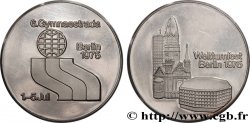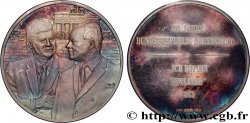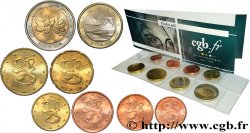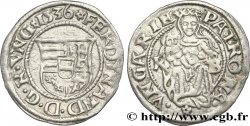fme_1055565 - RÉPUBLIQUE FÉDÉRALE D'ALLEMAGNE Médaille, Hans Vogel
50.00 €约 416.00 CNY
数量
加入购物车

种类 Médaille, Hans Vogel
日期: n.d.
铸币厂名称/城市 Allemagne
材质 silver
纯度、成色(用角密度) 999 ‰
直径 40 mm
模子方针 12 h.
重量 29,73 g.
侧面 lisse
印模 999
关于品相的说明
Patine hétérogène et brillance de frappe. Présence de marques de frottements liées à un nettoyage antérieur notamment au revers, de légères traces d’oxydation et de minimes rayures. La tranche présente des traces de manipulation
正面
正面的文字 HANS VOGEL 1881. 1945.
正面的说明书 Portrait de face.
背面
背面的文字 BAUMEISTER DER SPD // FREIHEIT / GERECHTIGKEIT / SOLIDARITÄT.
背面的说明书 Légende semi-circulaire et en 3 lignes avec deux branches de laurier. Titrage: 999.
背面的翻译 BÂTISSEURS DU SPD // LIBERTÉ / JUSTICE / SOLIDARITÉ.
评论
Médaille sous capsule.
Hans Vogel fut un homme politique social-démocrate allemand, membre du SPD, et une figure importante dans les années précédant et suivant la montée du nazisme. Né en 1881, il s'engagea tôt dans le mouvement ouvrier et devint député du Reichstag durant la République de Weimar. Après la prise de pouvoir par les nazis en 1933, le SPD fut interdit, et Vogel s’exila à l’étranger. Il joua un rôle central dans la direction du SPD en exil (Sopade), d'abord en France, puis à Prague et finalement à Londres. À travers cette organisation, Hans Vogel contribua à maintenir vivante la tradition social-démocrate allemande en dénonçant le régime nazi et en préparant l’avenir politique d'une Allemagne libre et démocratique. Il est resté président du SPD en exil jusqu’à sa mort en 1945, peu avant la fin de la guerre. Son engagement illustre la continuité et la résistance du SPD face aux dictatures du XXe siècle.
Medal in capsule. Hans Vogel was a German Social Democratic politician, a member of the SPD, and an important figure in the years before and after the rise of Nazism. Born in 1881, he became involved early in the labor movement and became a member of the Reichstag during the Weimar Republic. After the Nazi seizure of power in 1933, the SPD was banned, and Vogel went into exile abroad. He played a central role in leading the SPD in exile (Sopade), first in France, then in Prague, and finally in London. Through this organization, Hans Vogel helped keep the German Social Democratic tradition alive by denouncing the Nazi regime and preparing the political future of a free and democratic Germany. He remained chairman of the SPD in exile until his death in 1945, shortly before the end of the war. His commitment illustrates the continuity and resistance of the SPD in the face of 20th-century dictatorships.
Hans Vogel fut un homme politique social-démocrate allemand, membre du SPD, et une figure importante dans les années précédant et suivant la montée du nazisme. Né en 1881, il s'engagea tôt dans le mouvement ouvrier et devint député du Reichstag durant la République de Weimar. Après la prise de pouvoir par les nazis en 1933, le SPD fut interdit, et Vogel s’exila à l’étranger. Il joua un rôle central dans la direction du SPD en exil (Sopade), d'abord en France, puis à Prague et finalement à Londres. À travers cette organisation, Hans Vogel contribua à maintenir vivante la tradition social-démocrate allemande en dénonçant le régime nazi et en préparant l’avenir politique d'une Allemagne libre et démocratique. Il est resté président du SPD en exil jusqu’à sa mort en 1945, peu avant la fin de la guerre. Son engagement illustre la continuité et la résistance du SPD face aux dictatures du XXe siècle.
Medal in capsule. Hans Vogel was a German Social Democratic politician, a member of the SPD, and an important figure in the years before and after the rise of Nazism. Born in 1881, he became involved early in the labor movement and became a member of the Reichstag during the Weimar Republic. After the Nazi seizure of power in 1933, the SPD was banned, and Vogel went into exile abroad. He played a central role in leading the SPD in exile (Sopade), first in France, then in Prague, and finally in London. Through this organization, Hans Vogel helped keep the German Social Democratic tradition alive by denouncing the Nazi regime and preparing the political future of a free and democratic Germany. He remained chairman of the SPD in exile until his death in 1945, shortly before the end of the war. His commitment illustrates the continuity and resistance of the SPD in the face of 20th-century dictatorships.








 对产品描述纠错
对产品描述纠错 打印
打印 分享我的选择
分享我的选择 提问
提问 Consign / sell
Consign / sell
 产品介绍
产品介绍















